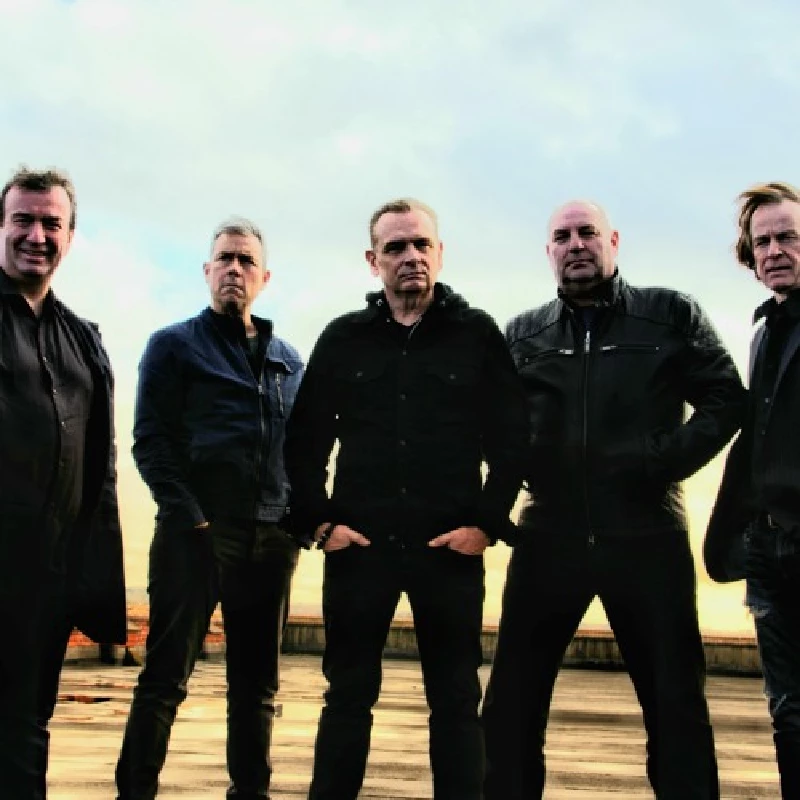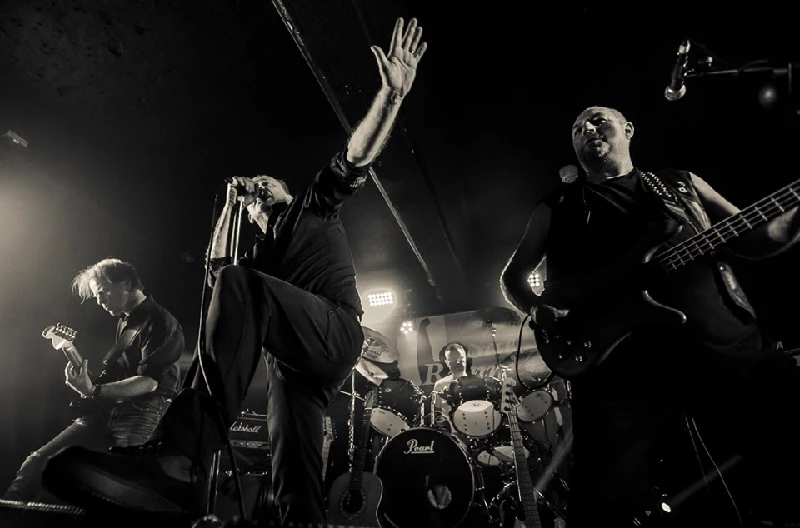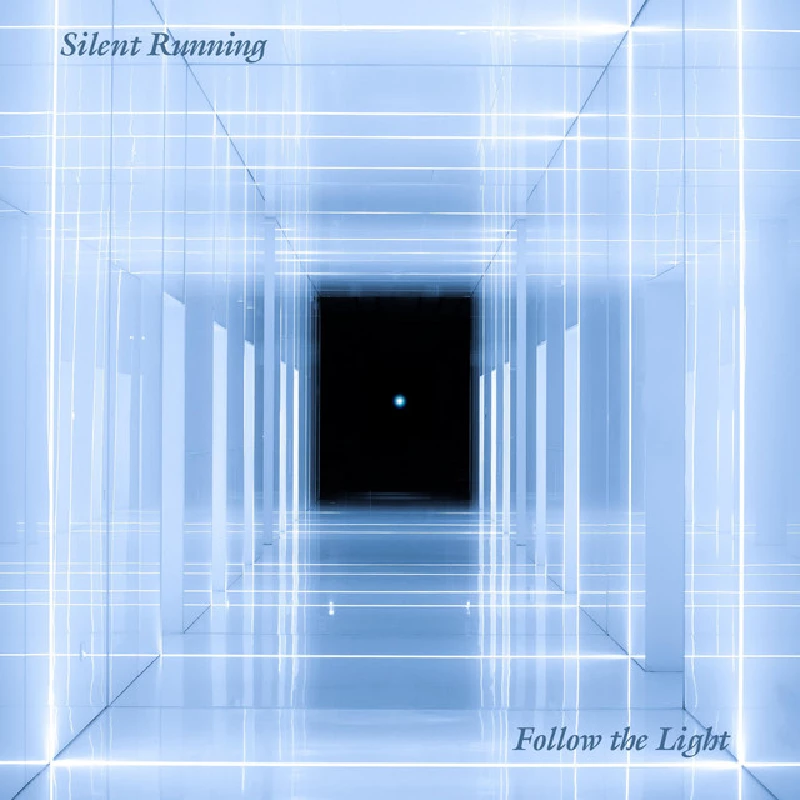Silent Running is a Nothern Irish rock group, who recorded three albums, ‘Shades of Liberty’ (1984), ‘Walk on Fire’ (1987) and ‘Deep’ (!989) on the major labels, Parlophone and Atlantic. They also played high profile support slots on tours with Talk Talk, Simple Minds, John Foxx and Robert Palmer, but folded in 1989 shortly after ‘Deep’ came out. Silent Running, which currently consists of Peter Gamble (vocals), Tony Scott (guitars), Richard Collett (bass), Paul Rocks (keyboards) and Gary Kirby (drums), reunited initially to play a few of their old songs in 2019 at the birthday party of one of their wives, and then for a sell-out gig in Belfast’s Voodoo club. They have just released their fourth album, the fiery and defiantly hopeful ‘Follow the Light’. Pennyblackmusic spoke to Peter Gamble about their reformation and ‘Follow the Light’. PB: It seems that this reformation has taken you all by surprise as much as your fan base. Would that be a fair assessment? PETER GAMBLE: Yes. To be honest, we didn’t really have a plan. We got back together organically. We played together at a party a few years ago, and somehow that made its way onto Facebook, and we found that we had quite a few fans including a little Facebook group. We thought that there might be something in it, and we booked a show and it sold out. So then we thought, “We have got fans. Why don’t we give them some new material?” and we started writing, and we didn’t think at first that we would get enough material for an album but we did. It just came together very naturally. We played Belfast again on the 10th April at a club called Voodoo, and we had people flying from Germany, Austria, some guy came from Dubai, Scotland and England. More people travelled for it than there were local people there (Laughs). It has been great. PB: Why do you think that you have reformed at this point in time after over three decades away? Was it a case simply of your families having grown up and you having more time to concentrate on it? PG: It was a mixture of things. Firstly, we didn’t do anything for a long time because we didn’t feel that anyone would have any interest, but it was also down to our age. We thought if we don’t do it now we are never going to do it. We hadn’t played together for so long but once we got in the same room together we all got the bug again and were fired up for it. We thought, “Lets’ give it a go!” I think when you are older there is not the same pressure, and there are no great expectations. and it is a lot more fun. Sometimes you can produce better material,. It has given us more of a united front than we used to have, possibly more than we ever did. PB: You have put out ‘Follow the Light’ on your own label Door. What have been the advantages and disadvantages of that? PG: The advantages are control. You can do a lot of stuff yourself these days because of the advantages in technology, and you can reach your fan base without having all the apparatus of a record company. So, that is the advantage, that we can link directly with the fans, and we have the control to make the music in exactly the way that we want it. The disadvantage is that you don’t have that big machine behind you, and you don’t have the finance that we did in the ‘80s when we had record deals and everything was done for you. It is not, however, the way most people are making these days. They are doing it for themselves. PB: You have said that you think that ‘Follow the Light’ is your “best album to date.” Why do you think that? PG: That is a matter of perspective. I said that and I also said that it is not for us to judge. From my own point of view the songs are, however, more consistent. I think that all albums when you have time pressures on you there is the odd track when you think afterwards, “What were we thinking of?” We were also really young, and maybe not as aware of things as we should have been at the time. With this one, there is a consistency there, and I also feel that we have more of a sound of our own. We basically made a real effort to draw things out of each other without having any direction put on us by a producer,and I think that the songs really benefited from that. The arrangements in particular I think are really good on this album. The production on it sounds better than on the earlier albums even though there was so much more money in PB: You recorded the album at Novatech in Belfast we you recorded the demos of the first three albums. Was that symbolic or was that just by chance? PG: it was symbolic. We actually tried one song in a different studio, and we were looking around for somewhere to record and we always enjoyed recording there and we hadn’t been there in – I don’t know – about forty years. It was the same guy still in there. He had done all the demos for our early stuff, and we all liked the demos and n some cases we preferred the demos to the finished thing because they had a bit more punch to them. So, he played us some stuff he had been doing with local bands, and we re-recorded the song that we had recorded elsewhere and it sounded so much better. Plus he is just a really nice guy and he understood the music. He did a great job of engineering it and it turned out well. PB: How easy was it recording this album against the backdrop of the pandemic? PG: A nightmare (Laughs). We started and then we were shut down and we had three or four months break and then we started again. The only good thing about it was that I was very determined that every song should be good, that there should be no fillers and we should keep pushing ourselves and try and write better stuff as we went along. We had these enforced breaks that gave us the opportunity to write more material, so it slowed us down but it might have been with hindsight beneficial as it gave us more time to work on new material, and I think that the album is perhaps stronger because of it. PB: You have also got two new members, Gary Kirby on drums and Paul Rocks on keyboards. What do you think they have brought to the line-up? PG: I always make a joke and call them the “wee young lads”, “the newcomers” but actually towards the end of our last time around before we called it a day and when we played live shows, those two guys, Paul and Gary, played drums and keyboards. We also did a gig in 1998 and they were both involved, so they were both a part of the band. This line-up is the most comfortable that we have all felt. Don’t get me wrong! The guys who were on the albums in the 1980s were tremendous musicians as well, but there is a great vibe between us all. Both guys are great musicians. Gary is a great drummer and Paul is a great keyboard player, and he can also play guitar and sing, but I think more importantly we are all of the same mindset. We all like the same music. We all feel the same passion about the songs. We all get on really well. PB: -There is a real defiant optimism to this album. You have called the album ‘Follow the Light’. You sing about “a beacon” against ‘The Darkest Hour’, and “stumbling through the darkness to you” on ‘Wildest Dreams’. What do you see as being “the light” or “the beacon”? PG: Right. In terms of myself, I was writing a song about a difficult situation having a hopeful outcome. You hope that people will identify with the lyrics if they are having a tough time, so ‘Darkest Hour’ was about a very tough time in my life and an illness in the family. The “beacon” is basically hope and relief. There is a line - “We will ride again”. That was about overcoming the illness, and partly about me singing to myself to maybe keep going. The title song on ‘Follow The Light’ is really about following your heart, how it can get you through difficult times and maybe guide you, but I also thought it was symbolic about our getting back together as a band as we all followed our hearts to get back to the band. ‘Wildest Dreams’ - and that line about the “darkness” - is about when you have problems in life if you have a partner you can hopefully get through it together. PB: The clever thing about your songwriting is that you leave it just open enough for fans to put their own interpretation on it. PG: Well, that is exactly it. I don’t like lyrics that preach to you or come across as you have all the answers to all the problems in life because you really don’t. What I try and do id write in a way that hopefully other people will have something in their lives that they can relate to. The lyrics are open enough so that you can interpret them in any way that you want and hopefully will. The best thing is when you write lyrics, and a fan tells you that they really identified with that or it helped them through a difficult time. I want people to look at the lyrics and say, “Well, that really relates to me as well. In my situation I can really see that. I feel the same way.” I always try and have a positive message, even if it is about a difficult subject. PB: ‘All the profits on your single ‘Darkest Hour’ are going to the Red Cross in the Ukraine. Could you say more about that? PG: Well, like a lot of people, we wanted to do something for the people of the Ukraine. We felt limited in what we could do, but we felt that song, the hopefulness in it, the lyric about “The light in the darkest hour”, was probably the most applicable in that horrible situation and then we came up with the idea of giving up all the profits from that song. PB: So far your gigs have been largely confined to Belfast since you got back together. Do you have plans to tour more widely? PG: We are hoping to. We are just waiting to see what reaction the album gets and see what offers we get. I would love to tour widely again, but we will just wait and see. I would love t come across the water and tour widely again. It was a great experience. PB: Thank you.
Band Links:-
https://silentrunning.band/https://www.facebook.com/SilentRunningBelfast/
https://twitter.com/silentrunninguk
Play in YouTube:-
Picture Gallery:-



intro
John Clarkson speaks to Peter Gamble, the frontman with Northern Irish rock group Silent Running, about his band’s recent reformation and their first album in thirty years, ‘Follow the Light’.
most viewed articles
current edition
Peter Doherty - Blackheath Halls, Blackheath and Palace Halls, Watford, 18/3/2025 and 21/3/2025Armory Show - Interview with Richard Jobson
Liz Mitchell - Interview
Lauren Mayberry - Photoscapes
Deb Googe and Cara Tivey - Interview
Max Bianco and the BlueHearts - Troubadour, London, 29/3/2025
Garfunkel and Garfunkel Jr. - Interview
Sukie Smith - Interview
Clive Langer - Interview
Maarten Schiethart - Vinyl Stories
previous editions
Heavenly - P.U.N.K. Girl EPBoomtown Rats - Ten Songs That Made Me Love....
Trudie Myerscough-Harris - Interview
Doris Brendel - Interview
Beautiful South - Ten Songs That Made Me Love...
Dwina Gibb - Interview
Pulp - Ten Songs That Made Me Love...
Kay Russell - Interview with Kay Russell
Oasis - Oasis, Earl's Court, London, 1995
Sound - Interview with Bi Marshall Part 1
most viewed reviews
current edition
Davey Woodward - Mumbo in the JumboNigel Stonier - Wolf Notes
Wings - Venus and Mars
Kate Daisy Grant and Nick Pynn - Songs For The Trees
Only Child - Holy Ghosts
Neil Campbell - The Turnaround
Philip Jeays - Victoria
Darkness - Dreams On Toast
Suzanne Vega - Flying With Angels
Charles Ellsworth - Cosmic Cannon Fodder
Pennyblackmusic Regular Contributors
Adrian Janes
Amanda J. Window
Andrew Twambley
Anthony Dhanendran
Benjamin Howarth
Cila Warncke
Daniel Cressey
Darren Aston
Dastardly
Dave Goodwin
Denzil Watson
Dominic B. Simpson
Eoghan Lyng
Fiona Hutchings
Harry Sherriff
Helen Tipping
Jamie Rowland
John Clarkson
Julie Cruickshank
Kimberly Bright
Lisa Torem
Maarten Schiethart